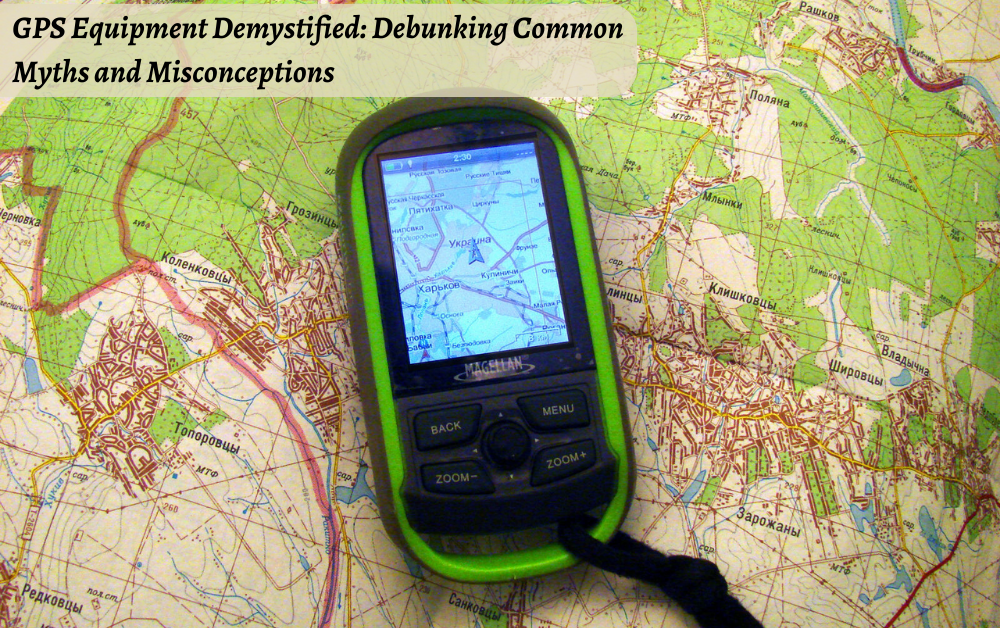Introduction
GPS equipment has become an integral part of our daily lives, aiding us in navigation, tracking, and location-based services. However, despite its widespread use, there are several myths and misconceptions surrounding GPS technology that need to be clarified. In this comprehensive guide, we aim to demystify these myths, providing you with a clear and accurate understanding of GPS equipment.
Myth 1: GPS is Always Accurate
One of the most common myths about GPS is that it’s infallible and provides pinpoint accuracy at all times. While GPS technology is highly precise, its accuracy can be influenced by various factors. It relies on signals from satellites orbiting the Earth, and these signals can be affected by obstructions, atmospheric conditions, and the number of visible satellites. In urban areas with tall buildings, or in dense forests, GPS accuracy can diminish due to signal blockage. Therefore, it’s essential to understand that while GPS is incredibly reliable, it may not always provide centimeter-level accuracy, especially in challenging environments.
The Reality: GPS Accuracy Varies
GPS accuracy can vary depending on the circumstances. In open areas with a clear view of the sky and multiple visible satellites, GPS devices can achieve high levels of accuracy. However, in urban canyons or heavily forested areas, accuracy may decrease. It’s crucial to consider these factors when using GPS for specific applications, such as land surveying or precise navigation.
Myth 2: GPS Drains Your Smartphone Battery Quickly
Many people believe that using GPS on their smartphones drains the battery rapidly. While it’s true that GPS can consume power, modern smartphones are equipped with energy-efficient GPS chips and optimization algorithms. These advancements ensure that using GPS for navigation or location-based apps doesn’t lead to excessive battery drain.
The Reality: Smartphones Are Efficient
Smartphones are designed to balance performance and power consumption. When using GPS, your phone optimizes power usage to extend battery life. This means that you can rely on GPS navigation apps without worrying about your battery dying quickly. It’s still a good practice to carry a charger or power bank for extended journeys, but GPS usage alone is unlikely to drain your battery rapidly.
Myth 3: GPS Can’t Work Indoors
Another common misconception is that GPS technology is only functional outdoors and cannot work indoors. While it’s true that GPS signals are less reliable indoors due to signal blockage, modern technology has found ways to overcome this limitation.
The Reality: Indoor GPS Solutions Exist
In indoor environments, where satellite signals are weak or obstructed, alternative technologies such as Wi-Fi positioning and Bluetooth beacons are used to provide indoor location services. Many smartphones and navigation apps seamlessly switch to these indoor positioning methods when GPS signals are unavailable. This allows GPS-related applications to function indoors, making it possible to use location-based services in shopping malls, airports, and other indoor spaces.
Myth 4: All GPS Devices Provide the Same Accuracy
Not all GPS devices are created equal in terms of accuracy. The level of precision you can expect from a GPS device depends on its technology, purpose, and price.
The Reality: Different Devices, Different Accuracy
High-end GPS devices designed for professional use, such as land surveying or geology, can provide centimeter-level accuracy. These devices utilize advanced technologies and multiple frequency bands to achieve exceptional precision. On the other hand, consumer-grade GPS devices like those found in smartphones or basic navigation units offer accuracy within a few meters. Understanding the purpose and capabilities of your GPS device is essential to ensure you select the right tool for your needs.
Myth 5: GPS Signals Can Be Easily Blocked
Some people believe that GPS signals are fragile and can be easily blocked by obstacles like tall buildings or dense foliage. While signal blockage can occur, GPS technology is more resilient than you might think.
The Reality: GPS Can Overcome Obstacles
GPS devices are equipped with multiple satellite reception channels, allowing them to receive signals from multiple satellites simultaneously. This redundancy minimizes the impact of signal blockage. Additionally, modern GPS technology incorporates advanced algorithms that can calculate your position even when some satellite signals are obstructed. While challenging conditions may temporarily reduce accuracy, GPS devices are designed to provide reliable navigation in various environments.
Debunking the Myths
In this guide, we’ve debunked common myths and misconceptions about GPS equipment by providing a clearer picture of how GPS technology works and its capabilities. GPS remains a powerful tool for navigation, tracking, and location-based services, and understanding its strengths and limitations is essential for making the most of this technology.
Conclusion
By demystifying these common GPS myths, we hope to empower you with accurate knowledge about GPS equipment. Whether you’re using GPS for outdoor adventures, daily navigation, or professional applications, having a realistic understanding of its capabilities will enhance your experience and enable you to make informed decisions when choosing and using GPS devices. GPS technology has revolutionized the way we navigate and explore our world, and with the right information, you can confidently harness its full potential.

